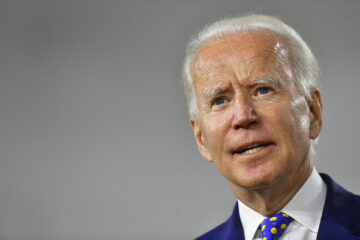by John Allen Paulos

Several years ago the Nobel committee selected two economists, Thomas Schelling of the University of Maryland and Robert Aumann of Hebrew University, to receive the prize for their stellar work on game theory. Aumann has contributed many seminal ideas with real-world applications, one in particular that is especially relevant today. It concerns the notion of “common knowledge,” which is crucial in understanding many phenomena from the stock market, family dynamics, and, most topically, to the present situation with President Joe Biden.
First the terms. A bit of information is deemed “common knowledge” among a group of people if all parties know it, know that the others know it, know that the others know they know it, and so on. It is much more than “mutual knowledge,” which requires only that the parties know the particular bit of information, not that they be aware of the others’ knowledge of it
Consider now the dynamic and often mysterious relations among extended families, networks of friends, and business colleagues, the open secrets that people know while remaining ignorant of others’ knowledge of the same. This is a nice illustration, among many, of the difference between mutual knowledge and common knowledge.
Once a bit of mutual knowledge becomes common knowledge, however this transition comes about, the revelation often leads to a drastic re-evaluation of the situation and a desire for some sort of action. This is certainly true with families, friends. and colleagues who finally share a common knowledge about some previously shadowy suspicions.
The relevance of this to Joe Biden and the Democrats’ situation is clear. Many people who have met the President in recent months have come away with private doubts and concerns about his future candidacy but remained unaware that many others had a similar uneasiness. Biden’s abysmal debate performance ended that, as millions of viewers became aware of his likely vulnerability during the upcoming campaign and possible further decline over the next four years. The result of this transition from mutual knowledge to common knowledge is the widespread call for the president to bow out and allow an arguably stronger candidate to take over with a presumed better chance to defeat Donald Trump.
There are other ways a proposition can become common knowledge. As Professor Aumann showed, one can prove a theorem that can be roughly paraphrased as follows: Two individuals cannot forever agree to disagree. As their beliefs, formed in rational response to different bits of private information, gradually become common knowledge, their beliefs change and eventually coincide.
To illustrate this latter classic way for common knowledge to arise, assume there is a trusted truth-teller and two students with mud on their foreheads. Each of the students can clearly see the other’s muddy forehead, but not their own. Their revered teacher arrives and sternly observes that at least one of the two students has a muddy forehead. Of course, the students already know this, but the teacher’s judgmental observation, which provides them only with this apparently redundant information, induces the students, after thinking a bit, to go off to clean off their foreheads.
Why? The first student infers that if his forehead were clean, then the second student would notice and conclude that the mud must be on his forehead and go off to clean it. Since the second student hesitates and doesn’t instantly react, the first student reasons that he must have a mud on his forehead. The second student reasons similarly and concludes he too must have a muddy forehead.
This process can be extended to 3, or 4, or more muddy students, and as long as the teacher observes that at least one of them has a mud on his forehead, then they all realize, after an interval of hesitation proportional to the number of students, that they all have all have mud on their foreheads, which now is an actuating bit of common knowledge.
Returning to Biden, I offer a perhaps strained analogy to the muddy forehead story. Was there months ago a tough-minded outside observer who had the stature to speak not to Biden, but to his family, staff, and advisors and tell them what they already knew, that certainly at least one of them was well aware of the President’s condition and verbal deficiencies and should have revealed them at the time. Doing so might well have set off a cascade of demands that he end his campaign long before the debate, an outcome that many people would favor (although I’m not sure I’m one of them). No disrespect or bad pun is intended in taking Biden’s situation and limitations as the analogue of a muddy forehead in the example above.
Of course, these are logical game-theoretic puzzles and are by no means dispositive. In fact, there are strong, quite defensible counterarguments that Biden is still the best-positioned candidate to defeat Trump and so should remain in the race. Politics is often more complicated than logic.
***
John Allen Paulos is an emeritus Professor of Mathematics at Temple University and the author of Innumeracy and A Mathematician Reads the Newspaper. These and his other books are available here.
Enjoying the content on 3QD? Help keep us going by donating now.
